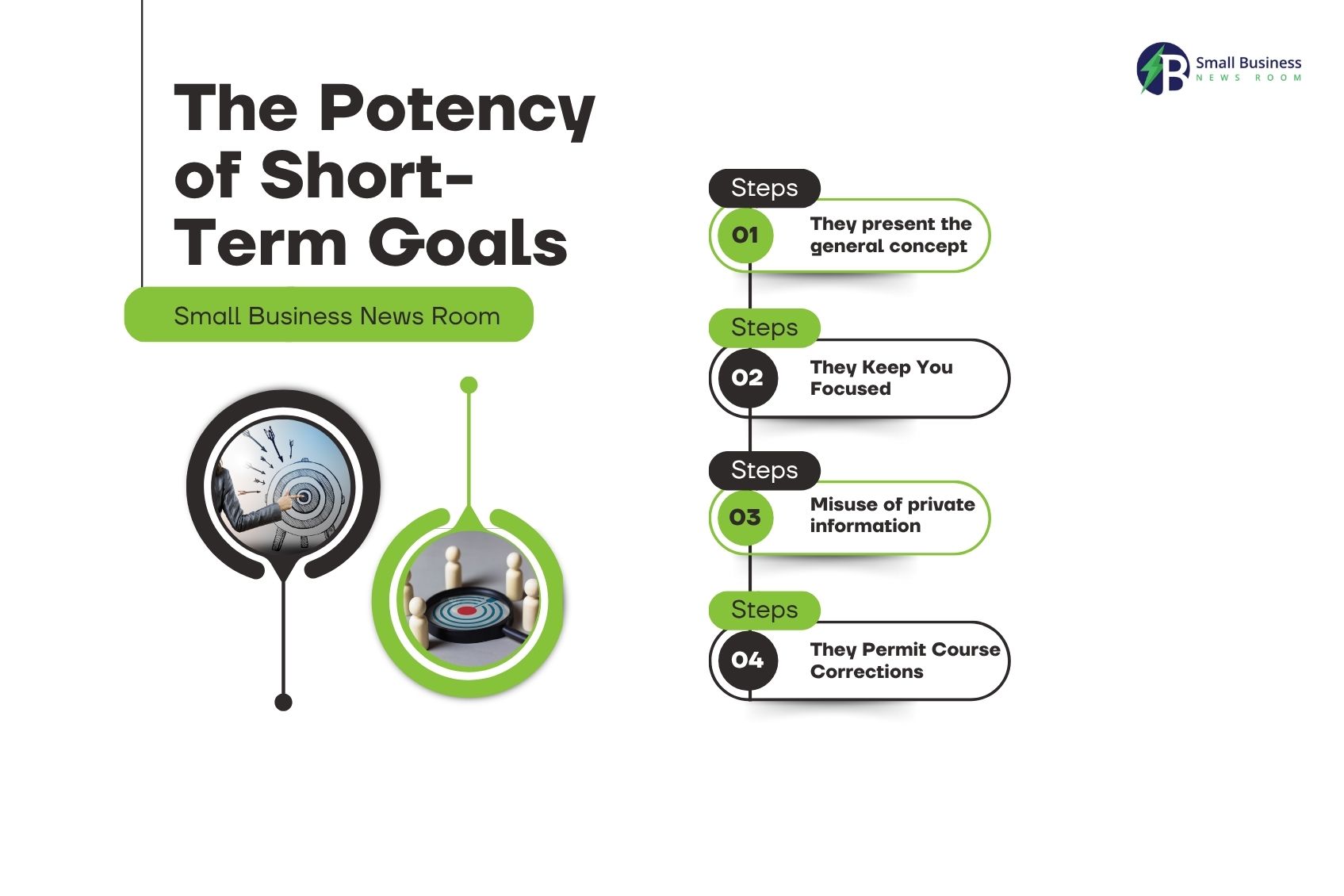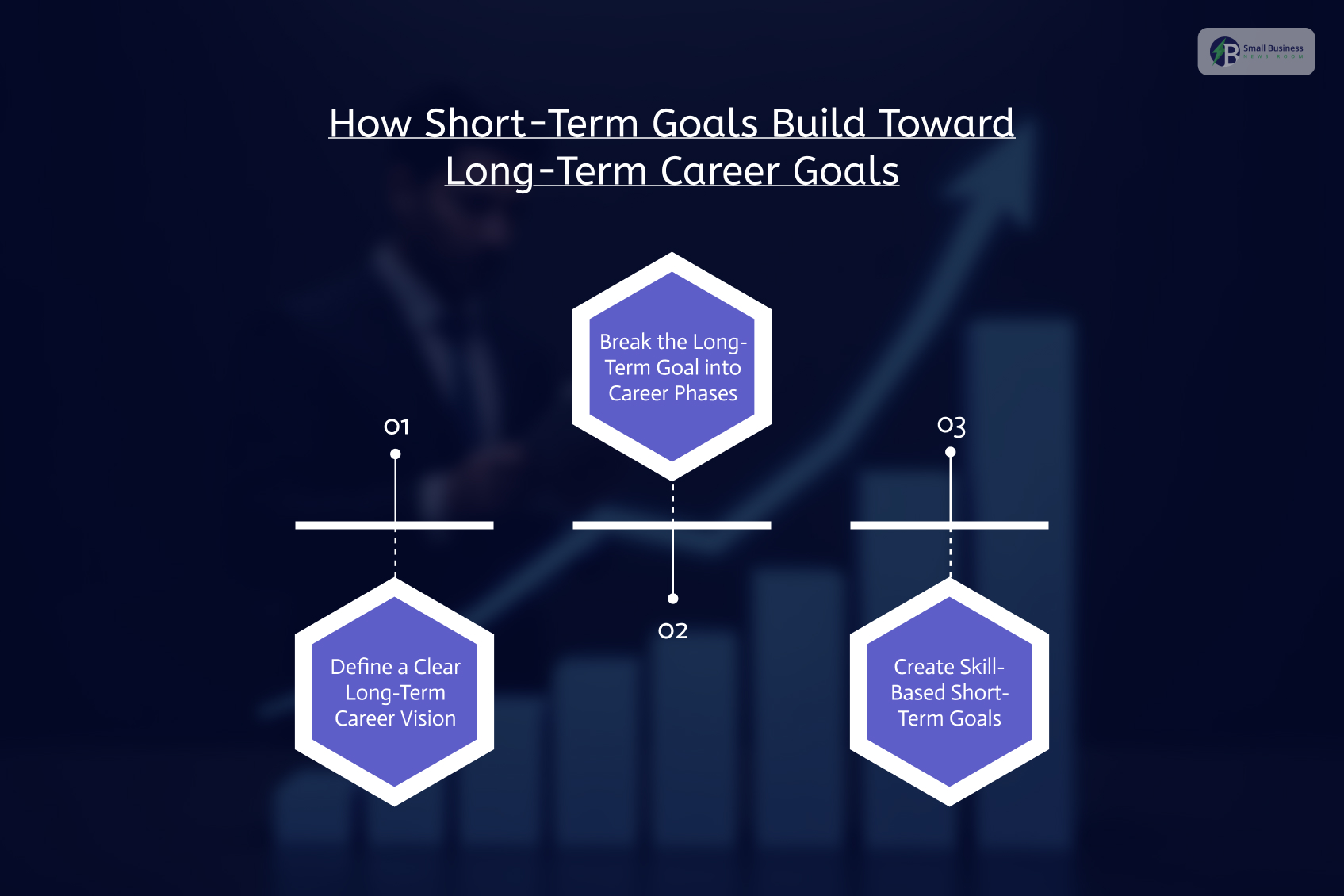Table Of Contents
- What Are Short-Term And Long-Term Goals?
- The Potency Of Short-Term Goals
- 1. They present the general concept.
- 2. They Keep You Focused
- 3. They instill confidence
- 4. They Permit Course Corrections
- Small Businesses And Short-Term Goals: The Ideal Combination
- The Strategic Link: How Short-Term Goals Build Toward Long-Term Career Goals
- Step 1: Define a Clear Long-Term Career Vision
- Step 2: Break the Long-Term Goal into Career Phases
- Step 3: Create Skill-Based Short-Term Goals
- How Short-Term Goals Improve Focus and Reduce Overwhelm?
- Adapting Short-Term Goals in a Rapidly Changing Job Market (2026 Perspective)
- 1. Flexibility Is a Career Advantage
- 2. Continuous Learning as a Short-Term Goal Strategy
- The SMART Framework: Turning Short-Term Goals into Results
- How Short-Term Goals Improve Performance Reviews and Promotions?
- Top 14 Clear Examples of Short-Term Goals for Work
- 1. Obtain A New Certificate Or Degree
- 2. Enhance Performance Measurements
- 3. Enhance Communication Skills
- 4. Update Your Resume And LinkedIn Profile
- 5. Promote The Work-Life Balance
- 6. Avoid Time-Wasters
- 7. Build A Personal Website
- 8. Build Workplace Relationships
- 9. Arrive Early For A Month
- 10. Organize Your Workspace
- 11. Read One Industry Book
- 12. Acquire A New Tool Or Technology
- 13. Start A Side Project
- 14. Observe A Peer Or Mentor’s Behavior
- FAQs
- 1. How do short-term goals help with career clarity?
- 2. Can short-term goals help with career changes or pivots?
- 3. How do short-term goals improve time management at work?
- 4. Should short-term goals focus more on skills or results?
- 5. How can short-term goals support leadership development?
- 6. What role does feedback play in short-term goal success?
- 7. Can short-term goals help prevent career burnout?
- 8. How do short-term goals contribute to career resilience?
- 9. Are short-term goals still relevant in highly automated or AI-driven careers?
- 10. What’s the best way to track short-term career goals?
- Small Wins Create Big Careers
How Can Short-Term Goals Best Lead Toward Accomplishing Long-Term Career Goals? [2026 Complete Guide]
Last Updated on: February 10th, 2026
No one can deny the fact that each of us has that big dream job or business concept in mind. You can envision yourself as a marketing director!
Perhaps owning a design firm or achieving financial independence. Your dream can even be expanding your small business into a national brand. The dream is wonderful. But the way to get there is too much.
So, how can short-term goals best lead towards accomplishing long-term career goals? The solution is short-term goals.
Throughout this article, we will thoroughly analyze the impact of short-term goals on long-term career objectives, their necessity, and how they can positively influence small businesses.
We will also provide 14 simple and practical examples of short-term goals that you can start implementing right now.
What Are Short-Term And Long-Term Goals?

Before we start discussing how, first we need to understand the what!
Short-term goals primarily refer to those that can be achieved within a relatively short period. The period can last from a day to around 6 months at most.
These goals are both low-level and feasible. These can be your daily habits, skill development, performance enhancement, or task completion.
On the other hand, it might take you a long time to reach your long-term goals. Your plans can be really big! An example of something that you would like to accomplish in your professional life.
This could include:
- Getting a leadership position,
- Starting a business,
- Becoming an expert, or
- Having enough money to live comfortably.
The key is to utilize short-term goals to achieve your long-term goals. Short-term goals are like steps on a ladder—it is impossible to leap to the top directly, but you can keep going up one step at a time.
The Potency Of Short-Term Goals

So, how can short-term goals best lead towards accomplishing long-term career goals? See below:
1. They present the general concept.
Let’s suppose your two-year vision is to be a team leader. That’s great—but it’s just not specific enough.
Short-term goals can be really helpful in translating your dream into concrete actions, like
Building effective communication skills,
Assuming more responsibilities, and
Getting a leadership certificate.
Each step gets you closer to your destination without causing you any anxiety.
2. They Keep You Focused
It is easy to get sidetracked or lose interest in long-term objectives. Short-term objectives keep you directed on what must occur right now.
Moreover, it can be this week or this month. They are like little road signs that remind you of what you are doing.
3. They instill confidence
It truly feels wonderful to be able to check something off your list. On top of that, once you start to achieve small victories, it will boost your confidence in yourself and your capabilities. It can be a strong motivation as you go along.
4. They Permit Course Corrections
By establishing and regularly tracking short-term goals, you can reflect on what you want, assess your progress, and adjust your direction if needed, without wasting years on the wrong path.
Small Businesses And Short-Term Goals: The Ideal Combination

If you own or work for a small enterprise, short-term goals can be very useful. Here’s why:
They Keep Things Agile. Small businesses work in high-speed conditions. Once you have established the short-term goals, it becomes simple for teams to be agile.
Moreover, you can rapidly adjust to
Market movements,
Unforeseen setbacks.
They assist teams to perform more efficiently. Once you break down projects into weekly or monthly goals, it enables you to stay on track and understand what needs to be accomplished. It also becomes simple to track progress.
They encourage new concepts. The latest marketing concepts, tools, or services, for a limited period, enable small businesses to learn quickly and make informed decisions.
They connect teams to the big vision. Let’s say your business objective is to increase revenue by 50% this year.
This creates short-term goals, such as
Increasing Instagram engagement
Improving product packaging, or
Enhancing employee training
This further keeps everyone focused on that big vision.
The Strategic Link: How Short-Term Goals Build Toward Long-Term Career Goals

Here are the steps to build short-term goals towards long-term career goals.
Step 1: Define a Clear Long-Term Career Vision
Start with clarity:
- What role, lifestyle, or expertise do you want long-term?
- What income level or work-life balance do you want?
- What impact do you want to make?
Example long-term goal:
Become a senior product manager in a global tech company within 10 years.
Step 2: Break the Long-Term Goal into Career Phases
Divide your journey into manageable stages:
| Career Phase | Focus |
| Entry / Growth | Skill acquisition |
| Mid-career | Leadership & specialization |
| Advanced | Strategic influence |
Each phase requires its own set of short-term goals.
Step 3: Create Skill-Based Short-Term Goals
In 2026, skills matter more than titles.
Examples:
- Complete AI or data literacy courses
- Improve cross-functional communication
- Learn project management tools
- Develop emotional intelligence
Each skill you gain becomes a building block toward your long-term goal.
How Short-Term Goals Improve Focus and Reduce Overwhelm?
Long-term goals can feel intimidating. Short-term goals:
- Narrow attention to what matters now
- Reduce anxiety and decision fatigue
- Prevent procrastination
Instead of asking:
“How do I become successful?”
You ask:
“What one skill or action moves me closer this month?”
Adapting Short-Term Goals in a Rapidly Changing Job Market (2026 Perspective)

Here is how you are going to adapt to a short-term goal in a rapidly changing job market in 2026.
1. Flexibility Is a Career Advantage
AI, automation, and global hiring have reshaped careers. Short-term goals allow you to:
- Pivot quickly
- Respond to industry shifts
- Avoid being locked into outdated plans
Long-term goals stay constant, but short-term goals evolve.
2. Continuous Learning as a Short-Term Goal Strategy
Instead of a single degree defining your career, 2026 professionals succeed by:
- Setting learning sprints
- Updating skills every 6–12 months
- Using micro-credentials and certifications
Short-term learning goals future-proof long-term ambitions.
The SMART Framework: Turning Short-Term Goals into Results
Short-term goals are most effective when they are SMART:
- Specific – Clear and focused
- Measurable – Progress can be tracked
- Achievable – Realistic within constraints
- Relevant – Aligned with long-term goals
- Time-bound – Deadline-driven
Example:
Complete a cloud computing certification within 90 days.
How Short-Term Goals Improve Performance Reviews and Promotions?
Managers evaluate:
- Consistency
- Initiative
- Growth mindset
Short-term goals provide:
- Clear evidence of progress
- Talking points during reviews
- Metrics that support promotion discussions
Top 14 Clear Examples of Short-Term Goals for Work
Here are 14 effective short-term goals for the workplace. They are best suited for small business teams and individuals. These are examples of how small things can make a big difference.
1. Obtain A New Certificate Or Degree

Let’s say you wish to be promoted or switch jobs. In that case, you have to earn a certificate in a valuable skill.
This can be based on digital marketing, Excel, UX design, or public speaking. Within 2-3 months, you can substantially enhance your resume and confidence.
2. Enhance Performance Measurements
Select a single KPI to focus on for a month. For example, if you are in sales, attempt to bump up your conversion rate by 10% by optimizing email scripts or following up.
3. Enhance Communication Skills
You have it in mind that you will be a leader someday. In this case, a good objective that you may set now can be: “Have a one-on-one conversation with every team member this month” or “Attend two meetings and contribute at least once in each.”
4. Update Your Resume And LinkedIn Profile
It is very easy and yet very important. Write down several things you are going to do to improve your resume and LinkedIn account: add your new skills, achievements, and certificates. This makes you open to new opportunities in the future.
5. Promote The Work-Life Balance
Burnout from work became a very common thing. If you were to think of a good short-term goal, it might be “stop working at 6 p.m. every day for the next two weeks” or “don’t look at weekends for emails.” Keeping this habit will allow your energy and mind to be in good shape for a long time.
6. Avoid Time-Wasters
Track your lost time during a week. Think vividly of such moments as your “waste of time” – social media scrolling or attending unproductive meetings. Then make a short-term goal; for example, “Reduce social media usage during work hours by 50%.”
7. Build A Personal Website

You are a freelancer, creative, or entrepreneur. Challenge yourself for 30 days to create a basic portfolio website with tools such as Wix, WordPress, or Notion. It gives your work a professional touch and visibility.
8. Build Workplace Relationships
Establish a goal to have one new co-worker or client interaction per week. Schedule brief coffee breaks or check-ins. Solid professional relationships can translate into mentorship, collaboration, and leadership roles.
9. Arrive Early For A Month
Getting to the office 10-15 minutes earlier each day helps you set and calm your mind, plus it shows that you care. This simple act can definitely get you noticed in a good way.
10. Organize Your Workspace
Plan a schedule for keeping your desk or virtual workspace clean and organized regularly. For instance, get rid of things you don’t need, organize folders, and have a weekly 10-minute cleaning session. A tidy place is a tidy mind.
11. Read One Industry Book
Decide to read only one book about your profession in the next 30 days. This book can be about your sector, leadership, or productivity. It is a small step to lifelong learning.
12. Acquire A New Tool Or Technology
Select the one tool or software that best suits your profession– for example, Canva, Excel, Trello, or AI software- and become an expert by using tutorials or practice for 30 days. It not only allows you to be more productive but also ensures you have future-proof skills.
13. Start A Side Project
Got an idea? Build a small MVP (minimum viable product) or blog. Even if it fails, you’ll have learned a lot and will have been more creative. And maybe it will be part of your future business model.
14. Observe A Peer Or Mentor’s Behavior

Ask the individual whom you look up to whether you can shadow them for a day or witness a crucial task. It is a good means to learn effective methods and implement them in your work.
The SMART Method of Setting Short-Term Goals
In order to have short-term goals function efficiently, use the SMART criteria:
Specific – Know exactly what you want to achieve.
Measurable – Ensure that progress can be measured.
Achievable – Make it possible.
Relevant – It must be related to your long-term objectives.
Time-specific – Set a precise deadline.
Rather than “I’ll improve my writing,” use “I’ll complete a Coursera business writing course in 30 days.
FAQs
Here are a few questions and queries that others have asked on the topic of short-term goals that you might find helpful at the same time.
1. How do short-term goals help with career clarity?
Short-term goals force you to define what progress looks like right now. By working on small, focused objectives, you gain clarity about your strengths, interests, and preferred work style helping you refine your long-term career direction over time.
2. Can short-term goals help with career changes or pivots?
Absolutely. Short-term goals are especially powerful during career transitions. They allow you to test new skills, industries, or roles with low risk before committing to a full career shift.
3. How do short-term goals improve time management at work?
Short-term goals help prioritize tasks that matter most. Instead of reacting to daily demands, you proactively allocate time to activities that align with your long-term career objectives.
4. Should short-term goals focus more on skills or results?
In 2026, the most effective approach combines both. Skill-based goals build long-term capability, while result-based goals provide measurable outcomes that demonstrate progress to employers or clients.
5. How can short-term goals support leadership development?
Leadership grows through practice. Short-term goals such as leading a small project, mentoring a colleague, or improving communication skills create real-world leadership experience over time.
6. What role does feedback play in short-term goal success?
Feedback ensures your efforts are aligned with expectations. Regular input from managers, mentors, or peers helps refine short-term goals and keeps them relevant to your long-term career path.
7. Can short-term goals help prevent career burnout?
Yes. Well-designed short-term goals promote balance by setting realistic workloads and encouraging reflection. They help you grow steadily without overextending yourself.
8. How do short-term goals contribute to career resilience?
By achieving small wins and adapting goals as conditions change, you build resilience—the ability to recover from setbacks and continue progressing toward long-term success.
9. Are short-term goals still relevant in highly automated or AI-driven careers?
More than ever. In AI-driven fields, short-term goals help professionals continuously update skills, stay competitive, and remain adaptable as roles evolve.
10. What’s the best way to track short-term career goals?
Popular methods in 2026 include:
- Digital planners
- Career dashboards
- Quarterly goal reviews
- AI-based productivity tools
Tracking progress reinforces accountability and motivation.
Small Wins Create Big Careers
In 2026, the most successful careers are built intentionally, not impulsively. Short-term goals act as stepping stones, transforming long-term dreams into daily actions.
When aligned properly, short-term goals don’t distract from long-term ambitions—they accelerate them.
Read More:















